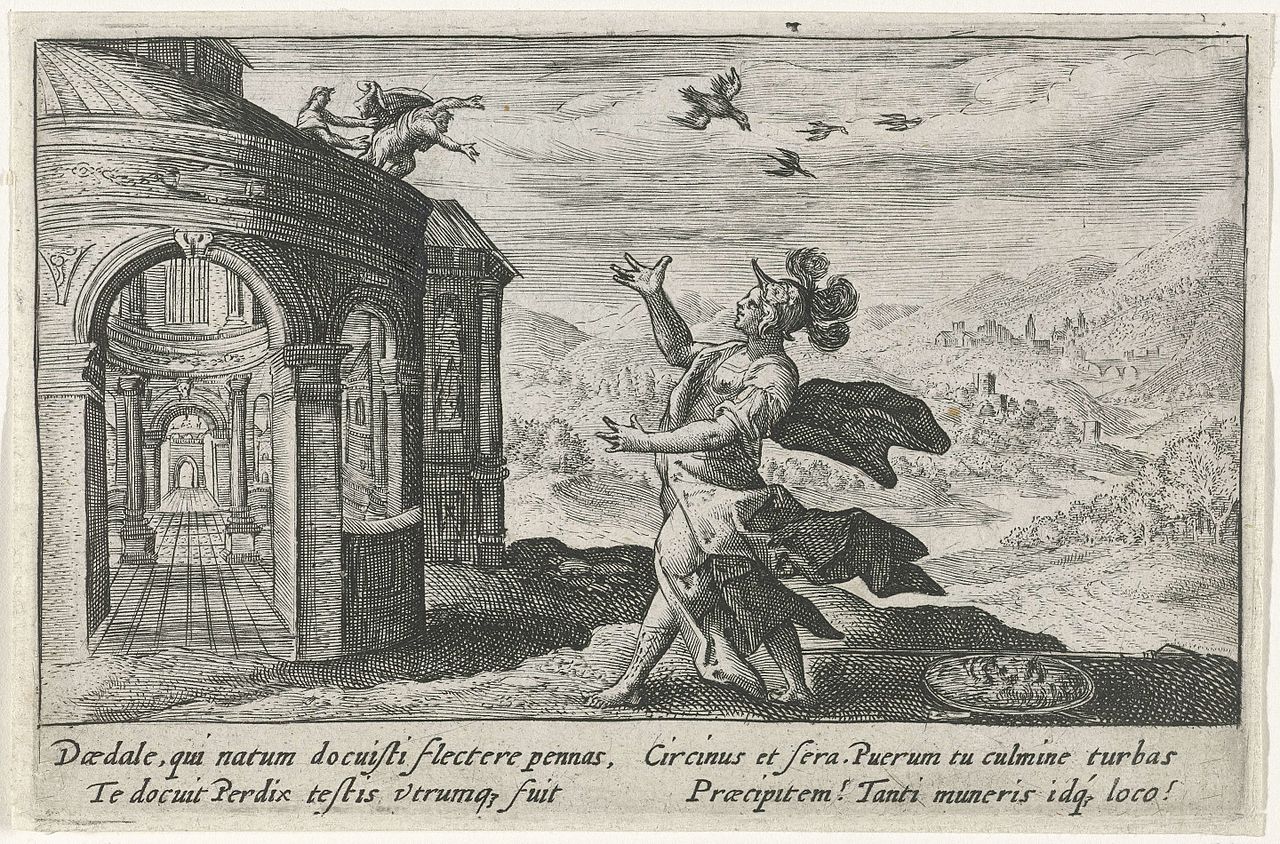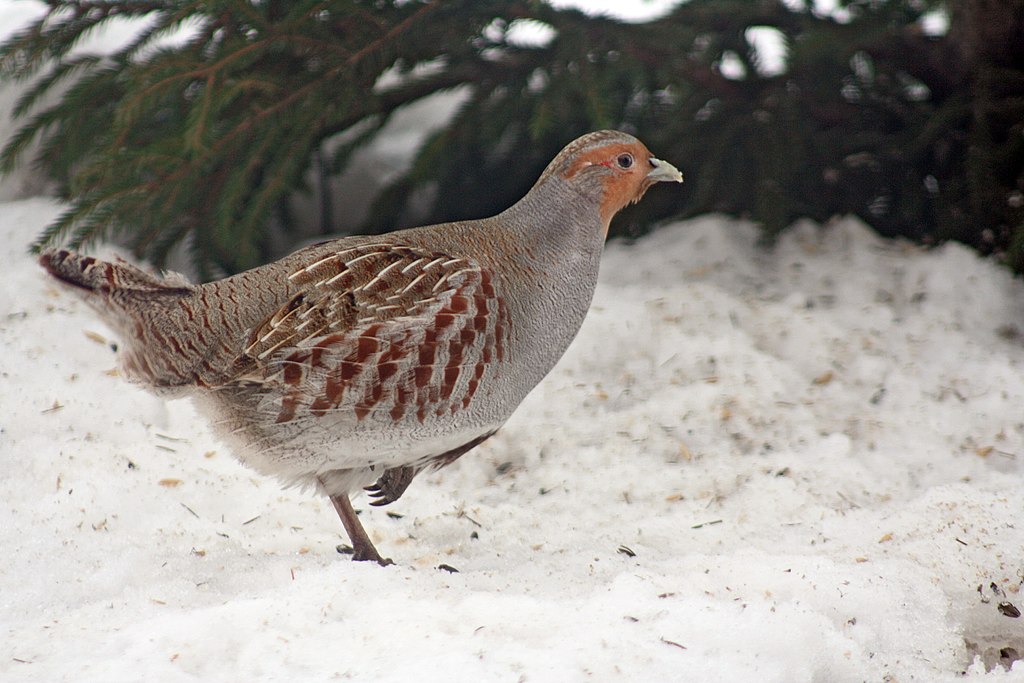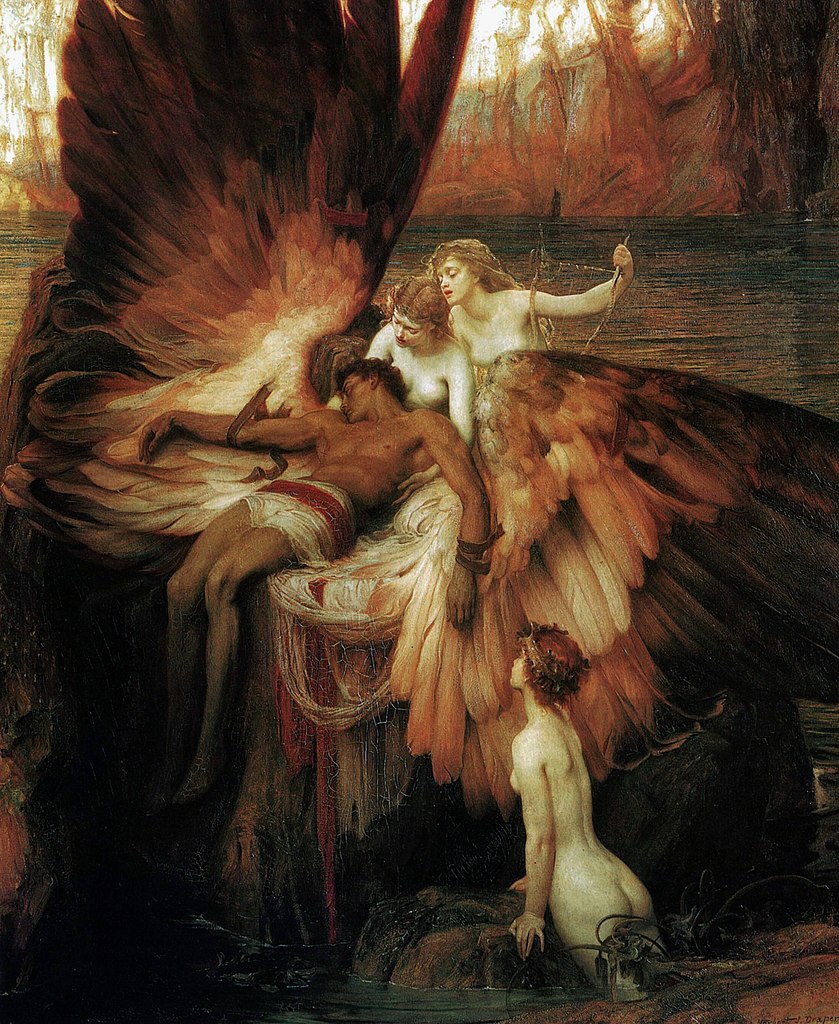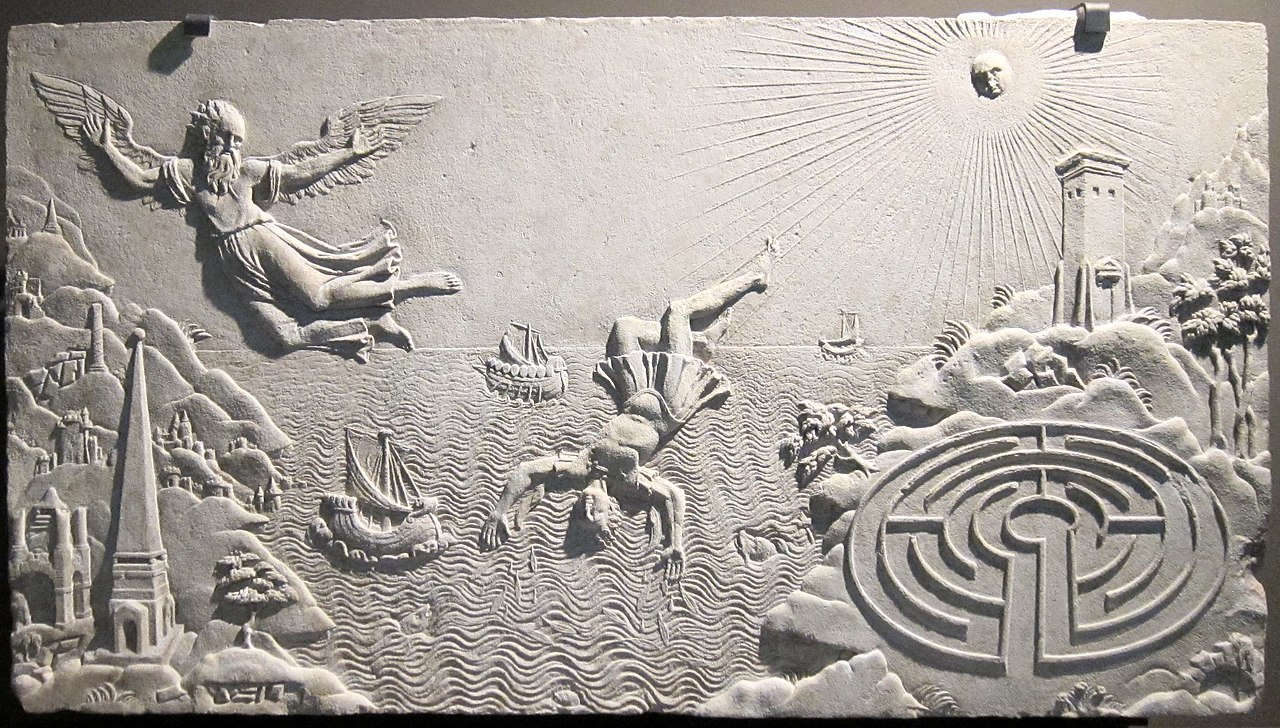Unit 4: Hubris and Nemesis

Daedalus, The Wonderful Artisan
Adapted from Old Greek Stories by James Baldwin, $\ccpd$
While Athens was still only a small city there lived within its walls a man named Daedalus who was the most skillful worker in wood and stone and metal that had ever been known. It was he who taught the people how to build better houses and how to hang their doors on hinges and how to support the roofs with pillars. He was the first to attach things together with glue. He invented many things that helped many people. He built a stone palace for Aegeus, the young king of Athens, and renovated the Temple of Athena which stood on the great rocky hill in the middle of the city.
Daedalus had a nephew named Perdix whom he had taken as a boy to be his apprentice. But Perdix was a very quick learner and soon surpassed his uncle in the knowledge of many things. His eyes were ever open to see what was going on about him, and he learned everything about the fields and the woods. Walking one day by the sea, he picked up the spine of a large fish, and from it he invented the saw. Seeing how a certain bird carved holes in the trunks of trees, he learned how to make and use the chisel. Then he invented the wheel which potters use to shape clay, and he made of a forked stick the first pair of compasses for drawing circles, and he studied out many other intriguing and useful things.
Daedalus was not pleased when he saw that the boy was so skilled and wise, so ready to learn, and so eager to do anything. “If he keeps on in this way,” he whispered to himself, “he will be a greater man than me; his name will be remembered, and mine will be forgotten.”

Day after day, while at his work, Daedalus reflected over this matter, and soon his heart was filled with hatred towards young Perdix. One morning when the two were putting up a decoration on the outer wall of Athena’s temple, Daedalus told his nephew to go out on a narrow scaffold which hung high over the edge of the rocky cliff where the temple stood. Then, when the boy obeyed, it was easy enough, with a strike of a hammer, to knock the scaffold down.

Poor Perdix fell headlong through the air, and he would have fatally landed upon the stones at the foot of the cliff had not kind Athena seen him and taken pity upon him. While he was falling through the air, she changed him into a partridge, and he flew away to the hills to live forever in the woods and fields which he loved so well. And to this day, when summer breezes blow and the wildflowers bloom, the voice of Perdix may still sometimes be heard, calling to his mate from among the grass and forest trees.
Minos
As for Daedalus, when the people of Athens heard of his appalling deed, they were filled with grief and rage-grief for young Perdix, whom all had learned to love, and rage towards the immoral uncle, who loved only himself. At first, they were for punishing Daedalus with the death which he so richly deserved, but when they remembered what he had done to make their homes nicer and their lives easier, they allowed him to live; and yet they expelled him from Athens.
There was a ship in the harbor just ready to start on a voyage across the sea, and in it Daedalus embarked with all his precious tools and his young son Icarus. Day after day the little ship sailed slowly southward, keeping the shore of the mainland always upon the right. At last the famous island of Crete was reached, and there Daedalus landed and made himself known; the King of Crete, who had already heard of his extraordinary skill, welcomed him to his kingdom and gave him a home in his palace, promising that he should be rewarded with great riches and honor if he would but stay and practice his craft there as he had done in Athens.
Now the name of the King of Crete was Minos. His grandfather, whose name was also Minos, was the son of Europa, a young princess whom a white bull, it was said, had brought her to Crete on his back across the sea from distant Asia. This elder Minos had been regarded as the wisest of men – so wise that Zeus chose him to be one of the judges of the Underworld. The younger Minos was almost as wise as his grandfather, and he was brave and far-seeing and skilled as a ruler of men. He had control of all the islands near his kingdom, and his ships sailed into every part of the world and brought back to Crete the riches of foreign lands. So it was not hard for him to persuade Daedalus to make his home with him and be the chief of his artisans.
And Daedalus built for King Minos the most wonderful palace with floors of marble and pillars of granite, and in the palace he set up golden statues which could talk. For luxury and beauty, there was no other building in all the wide earth that could be compared with it.
However, once again Daedalus committed a very perverse act. Every year, King Minos was required by Poseidon to sacrifice a white bull in honor of Europa’s founding of Crete. But this year, King Minos decided to keep the bull instead. Poseidon was extremely angry, but instead of punishing Minos, he decided to curse Minos’ wife, Pasiphae, with a very strange curse – to fall in love with the bull. Pasiphae begged Daedalus to come up with a way for her to consummate her love with the bull. Finally, acknowledging this as a challenge of his skill and wanting to see if he could make the impossible possible, Daedalus created a machine in the shape of a bull that she could hide in. Soon, Pasiphae became pregnant, and she told King Minos what Daedalus had done. If Minos hadn’t wished him to build other buildings for him, he would have put him to death and no doubt have punished him severely.


But one of those additional buildings that Minos needed built was for his own son – the Minotaur. He was a terrible monster, the like of which has never been seen from that time until now. This creature, it was said, had the body of a man, but the face and head of a wild bull and the fierce nature of a mountain lion. He was the terror of all the land, whose roars shook the whole kingdom. Where he was least expected, there he was sure to be; and almost every day some man, woman, or child was caught and eaten by him.
“This monster is your doings,” said the king to Daedalus. “I cannot kill my son, but his destruction will kill everyone else. Something must be done. Surely you can contain him.”
“I will build a house for him then,” said Daedalus, “and you can keep him in it as a prisoner.”
“But he may waste away and die if he is trapped up in prison,” said the king.
“He will have plenty of room to walk about,” said Daedalus; “and if now and then you feed one of your enemies to him, I promise you that he will live and thrive.”
So the wonderful artisan brought together his workers to the city of Knossos, and they built an impressive house with so many rooms in it and so many winding ways that no one who went far into it could ever find his way out again; and Daedalus called it the Labyrinth, and cleverly persuaded the Minotaur to go inside of it. The monster soon lost his way among the twisting and curving halls, but the sound of his terrible roars could be heard day and night as he wandered back and forth vainly trying to find some way to escape.
Icarus
“Until now,” said the king, “I have honored you for your skill and rewarded you for your labor. But you betrayed me and my wife, and so now you shall be my slave and shall serve me without any word of praise.”
Then he gave orders to the guards at the city gates that they should not let Daedalus leave at any time, and he set soldiers to watch the ships that were in port so that he could not escape by sea. But although the wonderful artisan was thus held as a prisoner, he did not build any more buildings for King Minos; he spent his time in planning how he might regain his freedom.
“All my inventions up until now,” he said to his son Icarus, “have been made to please other people; now I will invent something to please myself.”

So, all through the day, he pretended to be planning some great work for the king, but every night he locked himself up in his room and labored secretly by candlelight. By and by he had made for himself a pair of strong wings, and for Icarus another pair of smaller ones. Then, one midnight, when everybody was asleep, the two went out to see if they could fly. They secured the wings to their shoulders with wax and then jumped up into the air. They could not fly very far at first, but they did so well that they felt sure of doing much better in time.
Early one morning before King Minos had gotten from his bed, they put on their wings, jumped into the air, and flew out of the city. Once fairly away from the island, they turned towards the west, for Daedalus had heard of an island named Sicily, which lay hundreds of miles away, and he had made up his mind to seek a new home there.
All went well for a time, and the two bold flyers sped rapidly over the sea, skimming along only a little above the waves, and helped on their way by the cool east wind. Towards noon the sun shone very warm, and Daedalus called out to the boy who was a little behind and told him to keep his wings cool and not fly too high. But the boy was proud of his skill in flying, and as he looked up at the sun he thought how nice it would be to soar like it high above the clouds in the blue depths of the sky.
“At any rate,” said he to himself, “I will go up a little higher. Perhaps I can see the horses which draw the sun car, and perhaps I shall catch sight of their driver, the mighty Helios himself.”

So he flew up higher and higher, but his father who was in front did not see him. Pretty soon, however, the heat of the sun began to melt the wax with which the boy’s wings were attached. He felt himself falling through the air; the wings had become loosened from his shoulders. He screamed to his father, but it was too late. Daedalus turned just in time to see Icarus fall headlong into the waves, reminiscent of the way he saw Perdix falling. The water was very deep there, and the skill of the wonderful artisan could not save his child. He could only look with mournful eyes at the unforgiving sea and fly on alone to distant Sicily. There, men say, he lived for many years, but he never did any great work, nor built anything half as remarkable as the Labyrinth of Crete. And the sea in which poor Icarus drowned was called forever afterward by his name, the Icarian Sea.
Comprehension Questions
Answer the following questions according to the story.
- Who is Perdix, what happens to him and why?
- What happens to Daedalus after this?
- What is a labyrinth?
- Why did Daedalus design the labyrinth?
- Why did Daedalus create the wings?
- What were the wings made of?
- What happened to Icarus?
Critical Thinking and Vocabulary Questions
Answer the following questions. Compare your answers with a partner.
- What is Daedalus’ “hubris and nemesis”?
- What is Icarus’ “hubris and nemesis”?
- The idiom “Don’t fly too close to the sun” comes from this story. What does this idiom mean?
- Give an example of someone you know who “flew too close to the sun”. What did they do and what was the result of their actions?
CEFR Level: CEF Level B1




